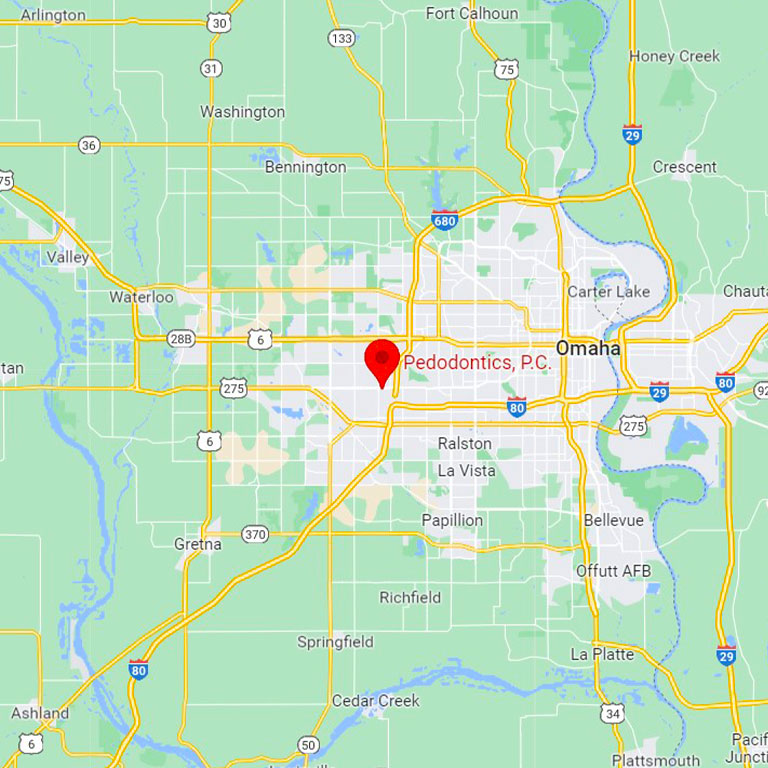Early Orthodontic Treatment

How early is too early for orthodontic treatment? Pedodontics, P.C., a children’s orthodontist in Omaha NE, says no earlier than age 7. This is the age when children begin growing faster and faster every year, and their teeth and mouths are growing, too. To stop major orthodontic issues and start treatment at the right time, take your child to a pediatric dentist in Omaha as soon as they can hold a toothbrush in their hands and attempt to brush their teeth.
Why Early Intervention Is So Important
Early intervention for orthodontic work is extremely important, especially if your child’s baby teeth were crooked and their adult teeth might come in crooked as well. An orthodontist can take X-rays of your child’s mouth to see where the adult teeth are currently sitting and developing below the gumline. If it looks like the adult teeth might not fit your child’s mouth or become impacted before the eruption, the orthodontist can take measures to prevent these issues.
Other problems that can be detected early and corrected through orthodontic treatment include:
- Expanding the palate and jaws to fit bigger adult teeth
- Correcting an overbite, underbite, or crossbite that is quite noticeable and/or problematic
- Correcting breathing or speech problems that are the result of your child’s teeth
- Correcting teeth that have erupted in the wrong areas of your child’s mouth (e.g., from the roof of the mouth or far above the gum line)
A pediatric dentist in Omaha can see some of these issues developing in X-rays, but other issues might not be apparent until your child starts to lose their baby teeth. A children’s orthodontist in Omaha, NE is a specialist in dentistry that can spot issues sooner than a dentist can and provide a treatment plan.
Other Reasons Why You Should Address Orthodontic Issues Early
The traditional method of waiting until children enter their teen years to correct the position and straightness of their teeth is no longer used. Orthodontists now understand that by the age of 12 or 13, orthodontic treatments are less effective because a child’s mouth is becoming less pliable for moving teeth and expanding the jaws. It is much more difficult to correct bite issues, too.
Children who receive orthodontic treatment in two phases, first in the pre-teen years and then in the teen years, have more successful outcomes with their teeth.
What is Phase I Orthodontic Treatment & What Can it Accomplish?
Phase I treatment is used to create an optimal environment for permanent teeth to erupt. In the past we waited until all of the permanent teeth had erupted and THEN we started treatment. We let the baby teeth fall out and used headgears to create space. We did not use space maintainers to their full extent and took out permanent teeth up to 50% of the time.
Today, we know that children ages 6-11 can benefit in many ways from early Interceptive treatment referred to as Phase I treatment.
Dr. Lisa Strunk is not only a pediatric dentist, she is an orthodontist; the only Dual trained specialist in Omaha who practices pediatric dentistry and orthodontics. As such, she checks her little patients dental health at their checkups but is also keeping an eye on their orthodontic growth and development.
Pedodontics P.C. is kid-friendly and fun. There are bright colors, big windows and even a waiting area that was converted into a big house. The office is open and happy.
The great thing about a dual trained specialist is that a complimentary growth and development assessment is included with every recall appointment. If everything looks okay, then the child will keep coming in every 6 months for their checkup. If, however, Dr. Lisa sees certain red flags, she may recommend space maintainers or an orthodontic evaluation to go over how Phase I treatment could create an environment for more optimal eruption and growth.
If you are ready to have your child’s teeth and mouth structure evaluated by an orthodontist, contact Pedodontics, P.C., in Omaha, NE.



